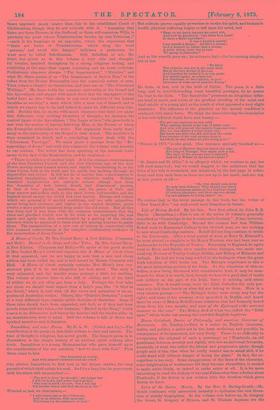Imauddeen, and other Poems. By E. A. W. (Nisbet and
Co.)—The -versification of the poems in this little volume is clear and smooth. The tone of thought is religions, but never goody. The longest poem in it, Intauddeen, is the simple history of an anxious spirit seeking after truth. Imauddeen is a young Mohammedan who gave himself up to the consideration of the one question, "how to meet with God." First there came to him
"One honoured as a saint, And with himself contented and his creed,"
who advises Imauddeen to find rest in the deeper studies, the very pursuit of which shall satisfy his souL And for a long time he perseveres, with his thirst still unquenched :—
"'The well is deep,' he thought, yet longer line I will let down, and water reach at last.' .The rock is hard,' he said, but I will dig Yet further down, and find the mine at last.'" Wearied at last, he determines,— " I will betake me to the wilderness, And in its silences, with open ear, Will listen for the utterance of God." But solitude proves equally powerless to soothe his spirit, and broken iu health, physical suffering begins to tell upon his mind, and "Then on the quick descent his spirit slid.
And now he question'd, 'Can there be a Lord? Is there a Ruler anywhere 9 It was a bootless search! I am myself a dream! All life's a dream! God is himself no better than a dream, A noble vision, truly, but in vain We grasp at phantoms!"
And so life wearily goes on ; he strives to find relief in cunning simples, but at last
"He knew The sickness was not in the outer shell, But in the very kernel of his son], And hopeless he endued it, as one made For mental agony, as others are
For blindness, or decrepitude, or pain Incessant of some nerve asunder wrung."
He finds, at last, rest in the faith of Christ. The poem is a little long, and is, notwithstanding some beautiful passages, by no means the best in the book. "The Sunstroke" possesses an altogether differ- ent kind of merit, and treats of the gradual clouding of the mind and final suicide of a young girl, as the result of what appeared a very slight sunstroke. The influence of the physical on the mental condition is rendered with much force. We think the lines following the description of her self-indicted death have real beauty :—
"The girl was innocent as any child Who, smiling, breaks some cup of fabrio rare, And sets, well pleased, the captive fragrance free! She, too, has shamed a fair costly cup ; She knew not what she did, and now the sweet Pure essence of her soul escapes from it. And finds its way where all pure being goes !"
"France in 1871" is also good. One sentence specially touched us :— "The joy of Harvest was not heard this year, Nor song of Vintage! War made such a din, The carol of the seasons pass'd unheard, And all is Winter in the nation's heart "St. James and St. Giles " is an allegory which, we venture to say, few will read unmoved ; but we would suggest to the authoress that the force of her tale is weakened, not enhanced, by the last page of reflec- tions, and that such lines as these are not up to her mark, and are not, in fact, poetry at all :— " Oh, why should men delay To help their fellows ? Why should any waste Their beauteous manhood in a fruitless round Of tedious pleasures, and their natures shrink Up into dulness by a long ennui?" ate.
We confess that is the worst passage in the book, but the writer of "New Year's Eve "can well avoid such blemishes in future.


































 Previous page
Previous page